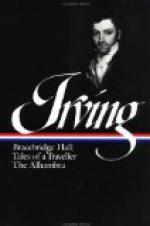At length I beheld old Ready-Money Jack making his way into the very thickest of the throng; tearing it, as it were, apart, and enforcing peace vi et armis. It was surprising to see the sudden quiet that ensued. The storm settled down at once into tranquillity. The parties, having no real grounds of hostility, were readily pacified, and in fact were a little at a loss to know why and how they had got by the ears. Slingsby was speedily stitched together again by his friend the tailor, and resumed his usual good humour. Mrs. Hannah drew on one side to plume her rumpled feathers; and old Christy, having repaired his damages, took her under his arm, and they swept back again to the Hall, ten times more bitter against mankind than ever.
[Illustration: Rumpled Feathers]
The Tibbets family alone seemed slow in recovering from the agitation of the scene. Young Jack was evidently very much moved by the heroism of the unlucky Phoebe. His mother, who had been summoned to the field of action by news of the affray, was in a sad panic, and had need of all her management to keep him from following his mistress, and coming to a perfect reconciliation.
What heightened the alarm and perplexity of the good managing dame was, that the matter had roused the slow apprehension of old Ready-Money himself; who was very much struck by the intrepid interference of so pretty and delicate a girl, and was sadly puzzled to understand the meaning of the violent agitation in his family.
When all this came to the ears of the squire, he was grievously scandalised that his May-day fete should have been disgraced by such a brawl. He ordered Phoebe to appear before him; but the girl was so frightened and distressed, that she came sobbing and trembling, and, at the first question he asked, fell again into hysterics. Lady Lillycraft, who had understood that there was an affair of the heart at the bottom of this distress, immediately took the girl into great favour and protection, and made her peace with the squire. This was the only thing that disturbed the harmony of the day, if we except the discomfiture of Master Simon and the general by the radical. Upon the whole, therefore, the squire had very fair reason to be satisfied that he had rode his hobby throughout the day without any other molestation.
The reader, learned in these matters, will perceive that all this was but a faint shadow of the once gay and fanciful rites of May. The peasantry have lost the proper feeling for these rites, and have grown almost as strange to them as the boors of La Mancha were to the customs of chivalry in the days of the valorous Don Quixote. Indeed, I considered it a proof of the discretion with which the squire rides his hobby, that he had not pushed the thing any farther, nor attempted to revive many obsolete usages of the day, which, in the present matter-of-fact times, would appear affected and absurd. I must say, though I do it under the rose, the general brawl in which this festival had nearly terminated, has made me doubt whether these rural customs of the good old times were always so very loving and innocent as we are apt to fancy them; and whether the peasantry in those times were really so Arcadian as they have been fondly represented. I begin to fear




